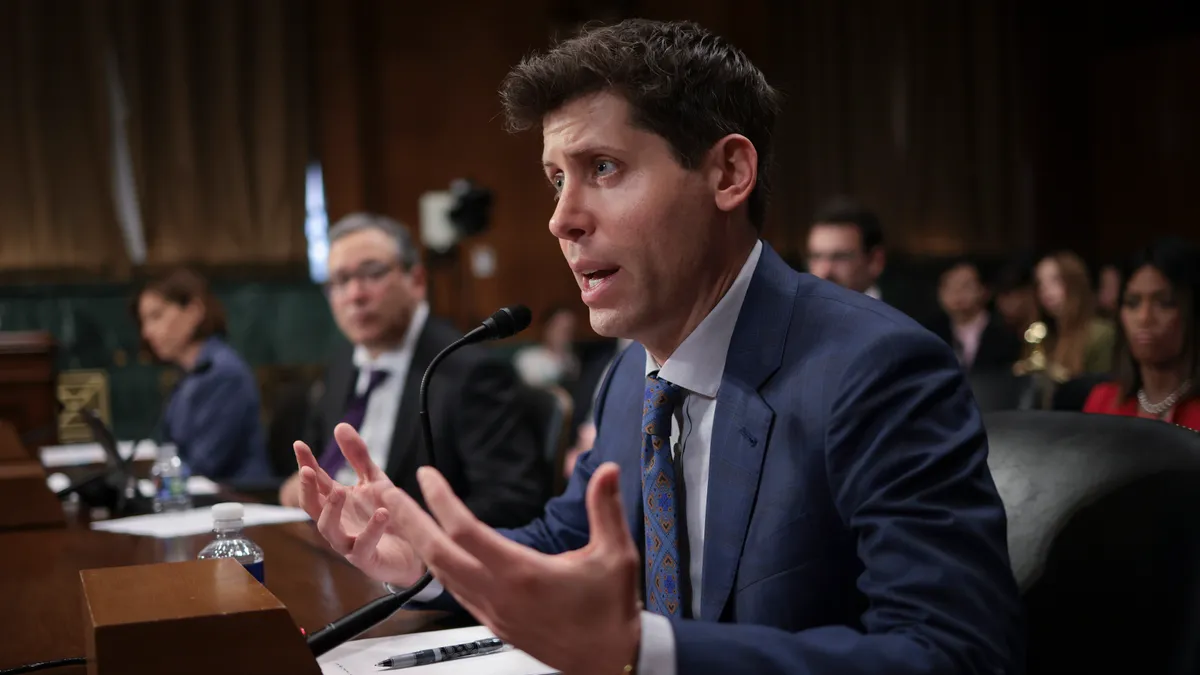Dive Brief:
-
Artificial intelligence technology providers like Open AI and Anthropic have collectively raised over $50 billion in total lifetime private funding, highlighting the strength of the fast-growing market, according to a recent report by research firm Everest Group.
-
OpenAI, which has raised a total of $11.3 billion since the San Francisco, California-based startup was founded in 2015, leads the top-50 list of AI providers by funding as of Sept. 30, according to the analysis. Anthropic is in second place with $5.55 billion and Databricks is in the No. 3 spot with $3.95 billion.
-
“With its groundbreaking innovation, AI continues to reshape industries, optimize processes, and redefine human-machine interactions,” the report said. The technology has garnered “substantial” interest, giving rise to more than 5,000 vendors in the past decade alone, it said.
Dive Insight:
This month marks a year since the debut of OpenAI’s game-changing “generative AI” tool known as ChatGPT, whose explosive success has kicked off an AI investment race among big tech companies.
As ChatGPT turns a year old, OpenAI faces the challenge of shaking off any fallout from recent leadership turmoil at the startup, as it also grapples with regulatory scrutiny and rising competition.
On Nov. 17, OpenAI announced the abrupt removal of its CEO, Sam Altman. The company’s action — which triggered a backlash from its employees and reportedly blindsided and angered Satya Nadella, the CEO of Microsoft, a major OpenAI backer — was reversed within less than a week.
Microsoft announced a multi-billion-dollar investment deal with OpenAI in January. Other major AI-related venture capital deals this year include Amazon’s agreement to invest up to $4 billion in OpenAI rival Anthropic.
“[I]T is important to recognize that the remarkable progress in AI owes much of its success to the substantial contributions of prominent broad-based technology providers such as Microsoft, Google, AWS [Amazon Web Services], IBM, and Meta,” the Everest Group report said. “These providers have been instrumental in propelling the advancement and widespread adoption of AI.”
The U.S. hosts the majority of AI tech providers (70%), yet new ones are emerging globally, according to the study. China follows the U.S. with a 12% share. Other countries, including the U.K., Canada, Israel, Germany, and France, hold much smaller shares.
Revenues of generative AI offerings across a broad range of categories are forecast to reach $3.7 billion this year and expand to $36 billion by 2028, according to S&P Global Market Intelligence.
AI-related terms were mentioned a total of 7,358 times in the earnings calls of S&P 500 companies during the second quarter — 4.6 more times than the previous quarter and 3.3 more times than in the fourth quarter of 2022, according to Business Insider.
In August, OpenAI said ChatGPT had been adopted by 80% of Fortune 500 companies. Earlier this month, Altman said 100 million people were going to ChatGPT weekly, and the company had more than 2 million developers building with its application programming interface, or API. He highlighted the milestones during a keynote speech at the company’s first developer conference in San Francisco, as previously reported by CFO Dive sister publication CIO Dive.
Meanwhile, the rapid rise of ChatGPT and generative AI in general is sparking a national and global debate about the need for guardrails to address the technology’s potential risks, which range from disinformation to data leaks.
A July study by London-based cybersecurity company CybSafe found that 89% of workers were potentially sharing confidential information with AI tools. Some of the workers polled (32% in the U.K. and 33% in the U.S.) said they’d probably continue using the technology, even if it was banned by their employer.
“As Generative AI infiltrates the workplace, it’s building a cyber-superhighway for criminals,” Jason Nurse, CybSafe’s director of science and research, said in a press release when the research was unveiled.
A sweeping executive order signed by President Joe Biden in October calls for the Labor Department to lead the development of a set of standards to guide companies in addressing AI’s potential harms to their workers, including eroded privacy and job displacement. It also directs the National Institute of Standards and Technology within the Commerce Department to establish guidelines to promote “safe, secure, and trustworthy” AI systems.
Members of Congress including Senate Majority Leader Chuck Schumer, D-N.Y., are also focused on the issue.
As the AI regulatory debate heats up, Federal Trade Commission Chair Lina Khan has vowed to police the market using the agency’s existing legal authorities. The commission is investigating whether OpenAI has violated consumer protection laws by putting personal reputations and data at risk, according to a July Washington Post report. As part of the probe, OpenAI was asked to provide detailed descriptions of all complaints it has received of its products making “false, misleading, disparaging or harmful” statements about people, the report said.















